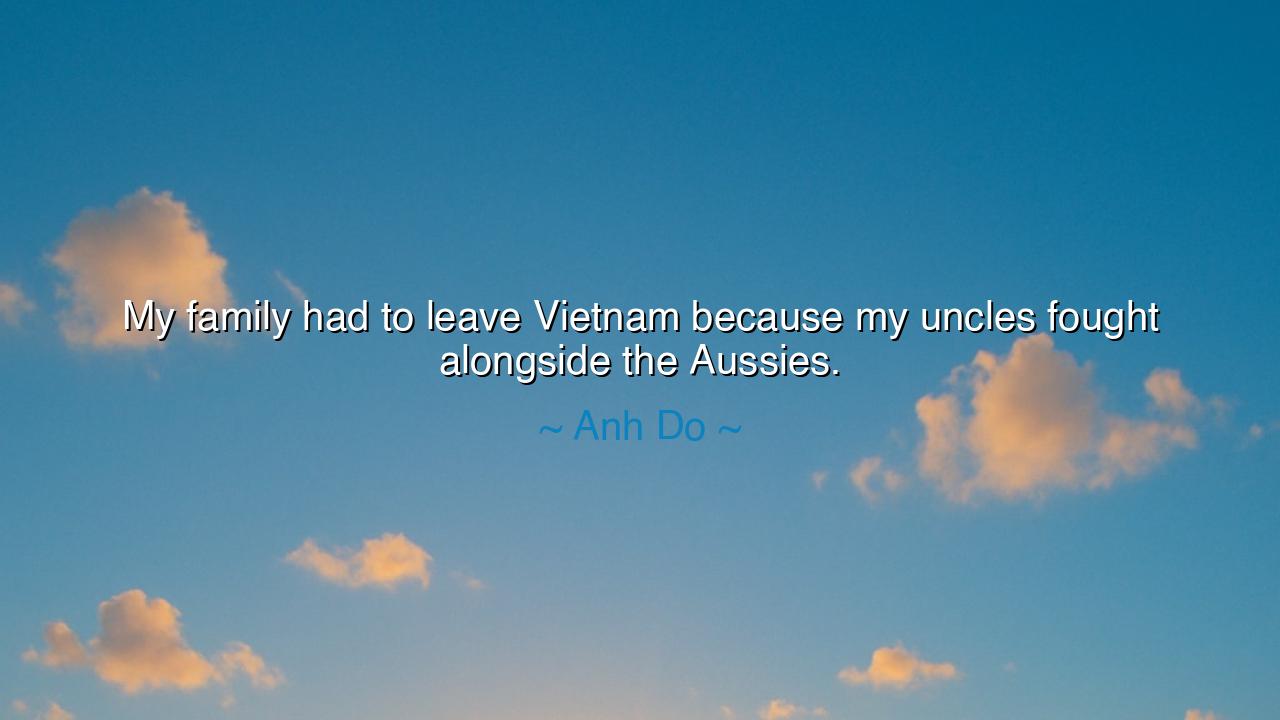
My family had to leave Vietnam because my uncles fought alongside






Host: The room was quiet, the soft light of the lamp casting a warm glow across the table. Outside, the world had quieted, and the peaceful rhythm of the evening filled the air. Jeeny sat at the table, her fingers lightly tracing the rim of her cup, deep in thought. Jack, standing near the window, gazed out at the darkened world, clearly reflecting on something deeper. There was a quiet understanding between them, as though a more meaningful conversation was about to unfold.
Jeeny: (breaking the silence, her voice calm but reflective) “I came across something by Anh Do today that really struck me. He said, ‘My family had to leave Vietnam because my uncles fought alongside the Aussies.’ What do you think about that?”
Jack: (pauses, his voice thoughtful) “It’s a deeply personal and powerful statement, isn’t it? Anh Do is sharing a piece of his family’s history—how their decision to leave Vietnam was shaped by their involvement in a larger conflict. It speaks to the idea of how family and loyalty can have such profound consequences on a person’s life. His uncles fought alongside the Australians, which probably put them at odds with those in power in Vietnam at the time, leading to a forced migration. It’s a reminder of how war and political alliances can disrupt personal lives and force people to leave everything behind.”
Jeeny: (nodding slowly) “Exactly. It’s not just about Anh Do’s personal story—it’s about the broader impact of political decisions on families. His family’s journey was shaped by their choices and loyalties, but those choices were influenced by the larger political forces at play. The need to leave their homeland wasn’t just about seeking a better life; it was about survival, about finding safety and security after being caught in the crossfire of international conflicts.”
Host: The stillness in the room deepened, as their words settled. Jack turned slightly toward Jeeny, his expression softening as he considered the broader meaning of Do’s statement. Outside, the world had quieted, but inside, the conversation had taken on a more introspective tone, reflecting on the displacement and sacrifice that often accompany conflicts and wars.
Jack: (his voice quieter now, more introspective) “What strikes me is how the story of one family’s migration is tied to so much history and sacrifice. Anh Do’s family wasn’t just fleeing their country—they were fleeing the consequences of their uncles’ involvement in a war. It’s a reminder that personal choices, like fighting for a cause or siding with one side, can have far-reaching consequences. It’s not just about the individual—it’s about the entire community and the ripples those actions send through generations.”
Jeeny: (softly) “Yes, and I think that’s what makes his story so poignant. It’s not just about loss—it’s about the resilience of his family. They left their home because of a conflict they didn’t start, but they found a way to rebuild, to survive, and to thrive in a new place. His family’s story is a reflection of the stories of so many people who’ve had to leave their homes due to circumstance, whether it’s war, politics, or persecution. But it’s also about how those experiences shape who we are and how we carry that legacy forward.”
Jack: (nodding slowly) “Exactly. And I think it speaks to how identity is shaped by migration and displacement. Anh Do’s family had to leave everything behind, but they also carried with them a sense of pride, loyalty, and a story that’s been passed down. It’s a reminder that no matter where we go, our past and our family’s history are always with us. That journey doesn’t just define the past—it shapes the future, too.”
Jeeny: (smiling gently) “Yes. And I think that’s why Anh Do’s story resonates so deeply. It’s a universal story of loss, survival, and adaptation. People around the world have had to leave their homes for countless reasons, but the shared experience of finding a way forward is something that unites us all. No matter the circumstances, that sense of hope and resilience is what we carry with us.”
Host: The quiet between them felt deeper now, as their conversation continued to unfold. Outside, the world had quieted, but inside, there was a shared understanding about the sacrifice and strength that comes from displacement. Jeeny and Jack had uncovered a deeper meaning in Do’s words—that the journey of migration, shaped by history and circumstance, is not just about leaving one place, but about carrying forward the resilience and identity that make us who we are.
Jack: (smiling softly, his voice more assured) “It’s a reminder that our roots—where we come from—are always with us, even when we’re forced to leave. The legacy of our experiences and our family’s journey shapes how we move forward.”
Jeeny: (nodding warmly) “Exactly. It’s about embracing that journey, no matter how difficult, and carrying the lessons and strength from the past into the future.”
Host: The world outside had quieted to a peaceful stillness, but inside, the room was filled with understanding. Jeeny and Jack had uncovered the truth in Anh Do’s words—that migration, shaped by war and politics, is not just a physical journey but one that shapes identity, resilience, and the strength to move forward. The night continued outside, but inside, the room felt full of the realization that our histories, our families, and our journeys are what define us and guide us forward.






AAdministratorAdministrator
Welcome, honored guests. Please leave a comment, we will respond soon